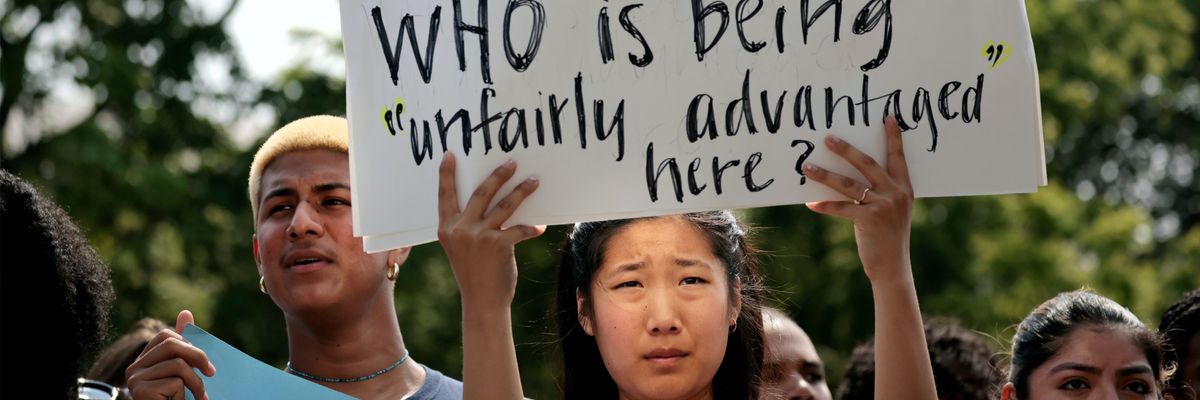In the wake of last week's U.S. Supreme Court ruling ending race-based affirmative action in college admissions, a coalition of civil rights groups on Monday filed a lawsuit challenging Harvard University's preferential treatment of applicants related to alumni and donors—a policy the litigants say "severely damages and harms" prospective students of color.
The lawsuit—filed by Lawyers for Civil Rights (LCR) on behalf of Chica Project, African Community Economic Development of New England, and Greater Boston Latino Network—claims that Harvard's donor and legacy admissions preferences violate Title VI of the Civil Rights Act of 1964 and asks the U.S. Department of Education's Office for Civil Rights to "take all measures necessary to
enforce Title VI and ensure Harvard's compliance with the statute and applicable regulations."
"Why are we rewarding children for privileges and advantages accrued by prior generations?"
The complaint notes that Harvard applicants related to donors were nearly seven times more likely to be accepted compared to other applicants during the years 2014-19, while legacy applicants were nearly six times likelier to be accepted. Roughly 17% of graduating Harvard students in 2019 had one or both parents who attended the school, while 28% had parents or other relatives who were alumni.
"There's no birthright to Harvard. As the Supreme Court recently noted, 'eliminating racial discrimination means eliminating all of it,'" LCR executive director Ivan Espinoza-Madrigal said in a statement.
"There should be no way to identify who your parents are in the college application process. Why are we rewarding children for privileges and advantages accrued by prior generations?" he added. "Your family's last name and the size of your bank account are not a measure of merit, and should have no bearing on the college admissions process."
According to the suit:
Each year, Harvard College grants special preference in its admissions process to hundreds of mostly white students—not because of anything they have accomplished, but rather solely because of who their relatives are. Applicants whose relatives are wealthy donors to Harvard, or whose parents are Harvard alumni, are flagged at the outset of Harvard's admissions process and are granted special solicitude and extra "tips" throughout. The students who receive these special preferences... are significantly more likely to be accepted than other applicants, and constitute up to 15% of Harvard's admitted students.
The students who receive this preferential treatment—based solely on familial ties—are overwhelmingly white. Nearly 70% of donor-related applicants are white, and nearly 70% of legacy applicants are also white.
At the same time that donor and legacy preferences disproportionately advantage white applicants, they systematically disadvantage students of color, including Black, Latinx, and Asian Americans.
The LCR lawsuit comes just days after the U.S. Supreme Court ruled in a pair of casesthat affirmative action admissions programs at two universities are unconstitutional. Dissenting, Justice Sonia Sotomayor accused the court's right-wing supermajority of "entrenching inequality in education."
"Harvard's practice of giving a leg-up to the children of wealthy donors and alumni—who have done nothing to deserve it—must end."
Last year, U.S. Sen. Jeff Merkley (D-Ore.) and Rep. Jamaal Bowman (D-N.Y.) introduced the Fair College Admissions for Students Act, which would bar colleges and universities from giving preferential treatment to children of alumni and donors.
"Harvard's practice of giving a leg-up to the children of wealthy donors and alumni—who have done nothing to deserve it—must end," LCR litigation fellow Michael Kippins said in a statement. "Particularly in light of last week's decision from the Supreme Court, it is imperative that the federal government act now to eliminate this unfair barrier that systematically disadvantages students of color."

